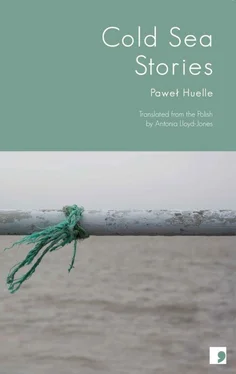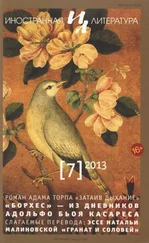Bjorn froze. He realised the meaning of the fact that there was no flag flying from the ship’s mast. Once, long ago, in a castle dungeon, he had heard some blood-chilling stories about robbers on the high seas. Of all the evildoers in this world they were the cruellest, showing no mercy even to their shipmates. If the ship really did belong to pirates, there could only be one explanation for their visit: there was treasure in the chest, which these people – no doubt being pursued by the royal navy – wanted to hide quickly. Bjorn’s conjecture was confirmed by the man in the hat: now he was walking along the beach, raking up sea kale on the tip of his cane, pausing now and then and looking all around, as if searching for a suitable spot for a hiding place. At the point where the cliff ended, dropping abruptly towards a plain, and the beach bordered on a pine forest, the man stopped beneath a sturdy tree and shouted something to the sailors. They grabbed hold of the chest. It must have been very heavy, because as they carried it they halted several times. Bjorn had to lean over the wall to see exactly what was happening under the tree: the sailors took a pickaxe and shovels out of the chest, closed the lid and set about digging a hole. Damp and stony, the ground did not give way easily, but the work proceeded remarkably quickly. Bjorn was also surprised by the ingenuity with which the chest was finally hidden. The lid was not covered with stones, but camouflaged with turf and some small juniper bushes planted on the spot. Like this it would be easy to get inside the chest without extracting it from the hole.
Eventually the man in the hat went back to the sloop, and the two sailors, wielding the pickaxe and the shovels, followed a few paces behind him, but none of the things that crossed Bjorn’s mind actually occurred on the stony beach at the foot of the cliff. Neither of the pirates fetched his chief a blow on the back of the head, split his skull or stuck a knife in his back, nor did the leader produce pistols from under the tails of his coat, suddenly turn around to face the sailors and fire at them point blank, mowing them down. But instead, on the stony beach at the foot of the cliff something happened that Bjorn could not understand at all. The sailors pushed out the sloop and started rowing towards the ship, on which the sails were already set, while the man in the black coat remained on the shore, taking no notice of the departing vessel, but inspecting something in his saddlebag. Once the ‘Doña Juanita’ had gathered wind, the newcomer threw his bag on his shoulder, drew a fantastic flourish in the air with his cane, glanced up at the rocks and, after finding a narrow gulley in the cliff with a path leading upwards, briskly set off ahead of him. As the path came out on the plateau in the exact spot several dozen paces from the precipice where Bjorn’s stone cottage stood, and in two or at most three minutes the stranger was bound to see it, Bjorn stepped back from the wall, ran across the pasture and hid behind the corner of the empty sheepfold, from where he could watch the newcomer without hindrance.
And the man was behaving very oddly. As soon as he was on the plateau, although he had undoubtedly caught sight of Bjorn’s cottage, he ignored this discovery, and instead of looking around the yard or calling for the farmer, he took a telescope from his bag and for some time watched the sea, following the departing sailing ship. Then he aimed the telescope inland, but what he could be looking for on the island remained an unfathomable mystery to Bjorn – all around stretched a bare plain, and even an eye equipped with a spyglass could not have seen the pinnacles of the church in Ventlinge from here, the smoke from the village or the large oak trees surrounding the squire’s estate. Finally the man folded the telescope, checked the position of the sun and only then, after a few dozen paces, did he investigate Bjorn’s yard. He peeped into the pigsty, went into the forge that hadn’t been active for years, and then finally without hesitating stepped inside the cottage, from where he quickly emerged, finding no one in. He briefly glanced towards the sheepfold, at which point Bjorn began to tremble, feeling as if the stranger’s gaze was capable of penetrating walls. Fortunately the man turned his eyes back in the direction of the plain, and eventually he headed that way, disappearing among the grasses, stones and juniper bushes of Alvaret plain. Bjorn busily noted a few more details in his memory: the newcomer was wearing tall boots, just like the royal reiters; under his coat and doublet he had a white shirt finished in lace; he wore no wig, but his long, raven-black hair was tied in a pigtail by a shiny silver hairpin, and he must have used expensive scent too, because a strong, musky odour lingered for a good few moments wherever he had paused.
Two days later, as Bjorn was coming down from the plateau towards the Ventlinge farm buildings, his mind and soul were full of anxiety. Had he done the right thing by lifting the turf and peeping inside the mysterious chest? What could the fact that it was empty mean? Had he concealed the lid well enough again? Who was the weird stranger, who had strode across the plateau with his saddlebag, telescope and cane, as if taking a stroll about the royal gardens? Why hadn’t he appeared again since then? Yet worst of all was the doubt – should he report it to the steward? The king’s and the squires’ law was clear on this point: no outsider could appear on the island without their knowledge. Anyone who saw a newcomer or a castaway was duty-bound to report it immediately to the steward or the pastor. And now as he descended towards the Ventlinge crofts, Bjorn suddenly imagined all the immense commotion. On hearing the news, the steward would instantly run to the squire’s rooms. The master would send a messenger to the hunting estate at Ottenby, from where the royal reiters would come at a gallop with a force of thirty people. They would have what was needed: dogs, torches, muskets, rapiers and long pikes. No clump of grass, copse, cave or rock, no shepherd’s shack on the plateau or abandoned hut would then be a safe, secure shelter. How would it look? The stranger, running between two riders with his hands tied behind his back and a noose around his neck, would finally reach the spot where the chest was hidden. But what then? Here Bjorn’s imagination let him down, for what could be expected from an empty chest buried between two pine trees? The king’s men would fly into a rage and thrash the prisoner – let him admit the truth and confess his crimes. But could an empty chest be a crime? In the end they’d be sure to hang the man on one of the pine trees. Bjorn had once seen this sort of execution, which the reiters called ‘gee up, pony’. Made to stand on the saddle, the condemned man had been hopping on tiptoes like a dancer, struggling to keep his balance, while the laughing soldiers swigged hooch. Then as if by the way, the officer had made the nag jump, and that was the end of the poor wretch: he was left dangling from the pine tree like a heap of old rags.
So once he was finally standing before the steward, reporting most obediently that the wall above the precipice was finished, and that in this connection, after a year’s break he, shepherd Bjorn, was ready to take on a flock again, with the gracious consent of the steward and with the blessing of His Lordship the squire, and when he heard the bubbling stream of invective that poured over him like pigswill, he decided not to let out a single squeak about the newcomer. Then everything happened according to the old rules. As he made a record in the register, the steward ordered Jansen, the chief herdsman, to count out thirty-three sheep for Bjorn; once that had been done, Jansen gave him a dog too.
Читать дальше












